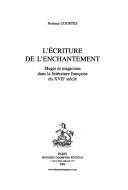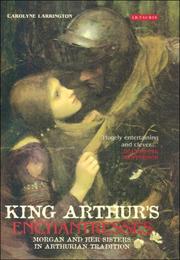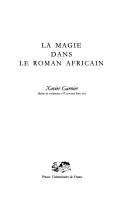| Listing 1 - 8 of 8 |
Sort by
|
Book
ISBN: 9782913193130 2913193137 Year: 2008
Abstract | Keywords | Export | Availability | Bookmark
 Loading...
Loading...Choose an application
- Reference Manager
- EndNote
- RefWorks (Direct export to RefWorks)
Book
ISBN: 9783110205947 3110205947 128339703X 9786613397034 3110210037 9783110210033 6613397032 9781283397032 Year: 2008 Volume: 2 Publisher: Berlin New York : Walter de Gruyter,
Abstract | Keywords | Export | Availability | Bookmark
 Loading...
Loading...Choose an application
- Reference Manager
- EndNote
- RefWorks (Direct export to RefWorks)
This is the first in-depth study of Apuleius' Metamorphoses to look at the different attitudes characters adopt towards magic as a key to deciphering the complex dynamics of the entire work. The variety of responses to magic is unveiled in the narrative as the protagonist Lucius encounters an assortment of characters, either in embedded tales or in the main plot. A contextualized approach illuminates Lucius' relatively good fortune when compared to other characters in the novel - this results from his involvement with the magic of a sorcerer's apprentice, rather than that of a real witch, and signals the possibility of eventual salvation. A careful investigation of Lucius' attitude towards Isis in book 11 and his relationship with the witch-slave girl Photis earlier on suggests that the novel's final book may be read as a second "Metamorphoses", consciously rewritten from a positive perspective. Last but not least, the book also breaks new ground by examining the narrative structure of the Metamorphoses against the background of the typical plotline found in the ideal romance. The comparison shows how Apuleius both follows and alters this plot, exploiting the genre to his own specific ends, in keeping with his central theme of metamorphosis.
Magic in literature. --- Magie dans la littérature --- Apuleius. --- Apuleius -- Madaurensis. -- Metamorphoses. --- Apuleius. -- Metamorphoses. --- Apuleius. Metamorphoses. --- Witches in literature. --- Ancient Magic. --- Ancient Novel. --- Genre. --- Isis. --- Narrative. --- Apulée (0125?-0180?). Les métamorphoses --- Magie --- Dans la littérature

ISBN: 2745309455 Year: 2004 Volume: 53 Publisher: Paris H. Champion
Abstract | Keywords | Export | Availability | Bookmark
 Loading...
Loading...Choose an application
- Reference Manager
- EndNote
- RefWorks (Direct export to RefWorks)
Thematology --- French literature --- anno 1600-1699 --- Magic in literature --- Magicians in literature --- Magie dans la litterature --- Magie in de literatuur --- Magic in literature. --- Magicians in literature. --- Magie dans la littérature --- Magiciens dans la littérature --- Littérature française --- Themes, motives. --- Thèmes et motifs --- Magie dans la littérature --- Magiciens dans la littérature --- Littérature française --- Thèmes et motifs --- 17th century --- Themes, motives
Book
ISBN: 2213026637 9782213026633 Year: 1991 Publisher: Paris : Fayard,
Abstract | Keywords | Export | Availability | Bookmark
 Loading...
Loading...Choose an application
- Reference Manager
- EndNote
- RefWorks (Direct export to RefWorks)
Greek magic --- Griekse magie --- Magic [Greek ] --- Magie [Griekse ] --- Magie grecque --- Charms --- Greek literature --- Magic in literature --- Magic, Greek --- Witchcraft --- Charmes --- Littérature grecque --- Magie dans la littérature --- Sorcellerie --- History and criticism --- Histoire et critique --- Religions antiques --- --Grèce --- --Sorcellerie --- --133.430938 --- Philosophy & psychology Magic Ancient World Greece --- 133.430938 --- --Greek magic --- Littérature grecque --- Magie dans la littérature --- --Charms --- Greece --- Grèce

ISBN: 2070718468 9782070718467 Year: 1990 Volume: *46 Publisher: Paris: Gallimard,
Abstract | Keywords | Export | Availability | Bookmark
 Loading...
Loading...Choose an application
- Reference Manager
- EndNote
- RefWorks (Direct export to RefWorks)
French literature --- anno 1800-1899 --- Magic in literature --- Magie dans la litterature --- Magie in de literatuur --- Littérature française --- Magie dans la littérature --- History and criticism --- Histoire et critique --- de Chateaubriand, François-René, --- Rimbaud, Arthur, --- 840-3 "18" --- Franse literatuur: proza--19e eeuw. Periode 1800-1899 --- 840-3 "18" Franse literatuur: proza--19e eeuw. Periode 1800-1899 --- Littérature française --- Magie dans la littérature --- 19th century --- Themes, motives --- de Chateaubriand, François-René, 1768-1848 --- Rimbaud, Arthur, 1854-1891 --- Litterature francaise --- 19e siecle

ISBN: 1845111133 9781845111137 1784530417 0755600002 075569497X 0857714066 6000008996 1429453680 Year: 2006 Publisher: London ; New York I.B. Tauris
Abstract | Keywords | Export | Availability | Bookmark
 Loading...
Loading...Choose an application
- Reference Manager
- EndNote
- RefWorks (Direct export to RefWorks)
King Arthur: the very name summons visions of courtly chivalry and towering castles, of windswept battlefields and heroic quests, and above all of the charismatic monarch who dies but who one day shall return again. The Arthurian legend lives on as powerfully and enduringly as ever. Yet there is an aspect to this myth which has been neglected, but which is perhaps its most potent part of all. For central to the Arthurian stories are the mysterious, sexually alluring enchantresses, the spellcasters and mistresses of magic who wield extraordinary influence over Arthur's life and destiny, bestriding the Camelot mythology with a dark and brooding presence. Carolyne Larrington brings these dangerous women vibrantly to life. Here is Morgan-le-Fay, a complex sorceress of great cunning and skill, immortalised by Helen Mirren's Morgana in John Boorman's film "Excalibur". Here too are the mystical Lady of the Lake; the beguiling Viviane, Merlin's deadly nemesis; and Morgause, Queen of Orkney, mother to Mordred, Arthur's incestuously-conceived son and his bitterest foe. Echoing the search for the Grail by the knights of the Round Table, Larrington takes her readers on an intriguing quest of her own - to discover why Arthurian enchantresses continue to bewitch us. Her journey takes in the enchantresses as they appear in poetry and painting, in politics and the theatre, on the Internet and TV, in high culture and popular culture. Whether they be chaste or depraved, necrophiliacs or virgins, benevolent or filled with hatred, the enchantresses represent a strain of femininity which continually challenges male chivalric values from within. These women are survivors. They outlive the collapse of Camelot and all it stands for. And it is as archetypal manifestations of the feared, uncontainable Other that they continue to inspire admiration, fright and fascination in equal measure. "King Arthur's Enchantresses" makes a unique contribution to contemporary writing on the Arthurian myths. It will intrigue and delight anyone with an interest in mythology, religion, cultural history and medieval literature.
Morgan le Fay (Legendary character) --- Arthurian romances --- Magic in literature. --- Women --- Legends --- Morgane (Fée) --- Cycle d'Arthur --- Magie dans la littérature --- Femmes --- Légendes --- Romances --- History and criticism. --- Mythology. --- Romans, nouvelles, etc. --- Histoire et critique --- Mythologie --- Arthur --- Legends. --- Thematology --- English literature --- legendary beings --- King Arthur [Fictitious character] --- Arthur, --- Arthur (roi) --- Morgane (personnage légendaire) --- Romans de la Table ronde --- Fées --- Littérature comparée --- Légendes --- Dans la littérature --- Thèmes, motifs

ISBN: 2130498787 Year: 1999 Volume: *2 Publisher: Paris Presses Universitaires de France
Abstract | Keywords | Export | Availability | Bookmark
 Loading...
Loading...Choose an application
- Reference Manager
- EndNote
- RefWorks (Direct export to RefWorks)
French literature (outside France) --- Fiction --- Thematology --- English literature --- Africa --- Sorcellerie dans la littérature --- Toverij in de literatuur --- Witchcraft in literature --- African fiction (French) --- Magic in literature --- Roman africain (français) --- Magie dans la littérature --- History and criticism --- Histoire et critique --- 840 <100> --- 840-3 --- African fiction --- -Magic in literature --- Black fiction (African) --- African literature --- Franse literatuur: extra muros --- Franse literatuur: proza --- Magic in literature. --- History and criticism. --- 840-3 Franse literatuur: proza --- 840 <100> Franse literatuur: extra muros --- Roman africain (français) --- Magie dans la littérature
Book
ISBN: 9789087041465 9087041462 Year: 2010 Volume: 12 Publisher: Hilversum : Verloren,
Abstract | Keywords | Export | Availability | Bookmark
 Loading...
Loading...Choose an application
- Reference Manager
- EndNote
- RefWorks (Direct export to RefWorks)
In de Middeleeuwen stond de klassieke dichter Vergilius ook bekend als tovenaar. In die hoedanigheid werden vanaf de twaalfde eeuw allerlei wonderlijke activiteiten aan hem toegeschreven. Zo zou hij de misdaad in Rome hebben uitgeroeid en een altijd brandende lamp hebben gemaakt. Rond 1525 drukte Willem Vorsterman in Antwerpen een tekst waarin een groot aantal van dit soort verhalen over Vergilius zijn verzameld. In Vergilius als tovenaar wordt deze tekst voor het eerst voor een groter publiek toegankelijk gemaakt. Aan de tekstuitgave gaat een inleiding vooraf waarin allereerst wordt belicht hoe Vergilius zich heeft ontwikkeld tot tovenaar. Daarnaast wordt uitgebreid aandacht besteed aan de literaire en culturele context waarbinnen de tekst aan het begin van de zestiende eeuw functioneerde. Bovendien is er in dit rijkelijk geïllustreerde boek aandacht voor de iconografische traditie rond Vergilius de tovenaar.
Medieval Dutch literature
---
Dutch poetry
---
Dutch literature
---
Magicians in literature
---
Magic in litterature
---
Poésie néerlandaise
---
Littérature néerlandaise
---
Magiciens dans la littérature
---
Magie dans la littérature
---
History and criticism
---
Histoire et critique
---
Virgil
---
Adaptations
---
Influence
---
094 VERGILIUS MARO, PUBLIUS
---
094.1 <493 ANTWERPEN>
---
Oude en merkwaardige drukken. Kostbare en zeldzame boeken. Preciosa en rariora--VERGILIUS MARO, PUBLIUS
---
Oude drukken: bibliografie--
| Listing 1 - 8 of 8 |
Sort by
|

 Search
Search Feedback
Feedback About UniCat
About UniCat  Help
Help News
News